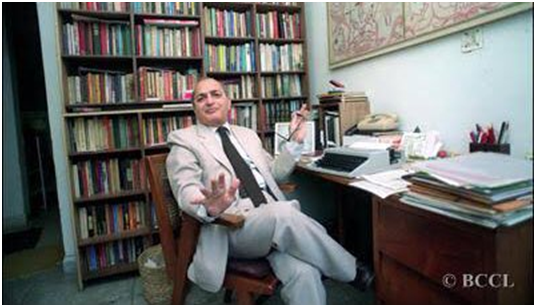RIP Inder Malhotra: A Professional With a Soul

A great journalist needs at least four vital qualities: good listening, good speaking, good reading and good writing. Good humour is a bonus.
Inder Malhotra, who has died in a New Delhi hospital, had all five in abundance and he willingly shared them with his many friends and colleagues spread across Asia, Europe and the United States where he was a Woodrow Wilson Fellow between 1992 and ’93.
At the time he was still serving as India correspondent of the London Guardian newspaper, although Malhotra’s Indian admirers remember him for his incisive syndicated columns and his earlier ‘middles’ published in the Kolkata-based Statesman, where he rose to be Deputy Editor, and the Delhi Editor of the Times of India where he worked from 1978-86.
It was at the Delhi and Kolkata offices of the then high quality Statesman where Malhotra first made his mark. He had started his professional life working for a news agency and regional Hindi publications, but he grew to love the Statesman and the high quality fellow journalists it attracted.
They included the likes of Prem Bhatia, who Malhotra referred to affectionately as ‘guruji’, Nihal Singh, Pran Chopra and Kuldip Nayar. After Prem Bhatia’s death died in 2005, Malhotra agreed to serve as Secretary of the Trust that was set up in his name to help promote good journalism by awarding annual media prizes.
It was also at the Statesman where Malhotra was able to develop and nuture some of his most important political contacts. They included cabinet ministers, civil servants, scientists and foreign diplomats, such as US ambassador and economist, John Kenneth Galbraith, all deeply interested in monitoring India as a leader of the non-aligned movement.
One of his key contacts – with whom he shared regular meals and drinks – was MP Feroze Gandhi, estranged husband of Indira Gandhi. In his posthumous comments about Feroze, Malhotra described how writing his obituary was “one of the most painful tasks l ever had to undertake”, adding that Feroze, “in spite of being surrounded by friends and admirers” was “essentially a lonely and unhappy man” who took to overwork which eventually killed him.
Feroze died of a heart attack back in 1960, but Malhotra kept extensive notes of their conversations and used them to devastating effect when he wrote his highly acclaimed personal and political biography of Indira, five years after she herself was gunned down in New Delhi by two of her bodyguards.
Indira was notoriously secretive about her personal life, and although aware that Malhotra was collecting material for a future biography, she did not punish him by freezing him out of her list of personal media contacts.
Malhotra will also be remembered for the sterling work he did on India’s evolving nuclear policies. In 1965 he correctly picked up a secret policy shift when the then prime minister, Lal Bahadur Shastri, claimed India was still committed to a peaceful nuclear policy but would consider using nuclear explosives to dig caves and tunnels.
Unlike many of his colleagues at the time , Malhotra made sure he paid keen attention to Shastri’s policy decision of making key policy statements in Hindi, which is why he was quickly able to pick up and analyse the significance of what he heard about the country’s nuclear options.
Malhotra was born in 1930 and at 17, when India won its independence, was old enough to personally recall some of the worst excesses of British colonial rule. Before joining the national media in New Delhi, he worked at regional outlets in the Punjab. He was immensely proud of his Punjabi roots and in later years used to regale friends with stories of how he nurtured himself as a student by eating relatively cheap lunches of radishes and ‘rotis’ (gajar/roti ka khana). At the time he could not possibly anticipate something like the 2013 Ramnath Goenka award for excellence in journalism.
His wife Rekha, a classical dancer with the Ram Gopal dance troupe, pre-deceased him in 2007. Their son, Anil, who lives in Washington DC. , led the Sunday (today) funeral rites that were attended by other members of the family and a bevy of friends and admirers, including former Prime Minister Manmohan Singh and leading members of the national media.
(Shyam Bhatia is a senior journalist)



